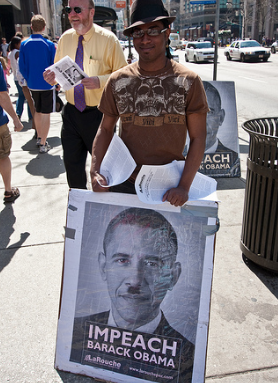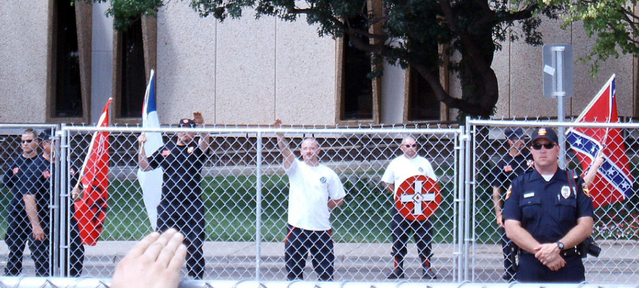Bias
When It's Not About Race Per Se
Mistaking disagreements over social values for racism
Posted November 18, 2016
We can use facts about human evolutionary history to understand the shape of our minds; using it to understand people's reactions to race is no exception.
As I have discussed before, it is unlikely that ancestral human populations ever traveled far enough, consistently enough, throughout our history as a species, to have encountered members of other races with any regularity. Different races, in other words, were unlikely to be a persistent feature of our evolutionary history. As such, it seems correspondingly unlikely that human minds contain any modules that function to attend to race per se. Yet we do seem to automatically attend to race on a cognitive level (just as we do with sex and age), so what's going on here? The best hypothesis I've seen as of yet is that people aren't paying attention to race itself as much as they are using it as a proxy for something else that likely was recurrently relevant during our history: group membership and social coalitions (Kurzban, Tooby, & Cosmides, 2001). Indeed, when people are provided with alternate visual cues to group membership—such as different color shirts—the automaticity of race being attended to appears to be diminished, even to the point of being erased entirely at times.

If people attend to race as a byproduct of our interest in social coalitions, then there are implications here for understanding racial biases as well. Specifically, it would seem unlikely for widespread racial biases to exist simply because of superficial differences like skin color or facial features; instead, it seems more likely that racial biases are a product of other considerations, such as the possibility that different groups—racial or otherwise—simply hold different values as social associates to others. For instance, if the best interests of group X are opposed to those group Y, then we might expect those groups to hold negative opinions of each other on the whole, since the success of one appears to handicap the success of the other (for an easy example of this, think about how more monogamous individuals tend to come into conflict with promiscuous ones). Importantly, to the extent that those best interests just so happen to correlate with race, people might mistake a negative bias due to varying social values or best interests for one due to race.
In case that sounds a bit too abstract, here's an example to make it immediately understandable: Imagine an insurance company that is trying to set its premiums only in accordance with risk. If someone lives in an area at a high risk of some negative outcome (like flooding or robbery), it makes sense for the insurance company to set a higher premium for them, as there's a greater chance they will need to pay out; conversely, those in low-risk areas can pay reduced premiums for the same reason. In general, people have no problem with this idea of discrimination: It is morally acceptable to charge different rates for insurance based on risk factors. However, if that high-risk area just so happens to be one in which a particular racial group lives, then people might mistake a risk-based policy for a race-based one. In fact, in previous research, certain groups (specifically liberal ones) generally say it is unacceptable for insurance companies to require those living in high-risk areas pay higher premiums if they happen to be predominately black (Tetlock et al, 2000).
Returning the main idea at hand, previous research in psychology has tended to associate conservatives—but not liberals—with prejudice. However, there has been something of a confounding factor in that literature (which might be expected, given that academics in psychology are overwhelmingly liberal). Specifically, much of that literature on prejudice asks about attitudes towards groups whose values tend to lean more towards the liberal side of the political spectrum, like homosexual, immigrant, and black populations (groups that might tend to support things like affirmative action, which conservative groups would tend to oppose). When that confound is present, then it's not terribly surprising that conservatives would look more prejudiced, but that prejudice might ultimately have little to do with the target's race or sexual orientation per se.
More specifically, if animosity between different racial groups is due primarily to a factor like race itself, then you might expect those negative feelings to persist even in the face of compatible values. That is, if a white person happens to not like black people because they are black, then the views of a particular black person shouldn't be liable to change those racist sentiments too much. However, if those negative attitudes are instead more of a product of a perceived conflict of values, then altering those political or social values should dampen or remove the effects of race altogether.

This idea was tested by Chambers et al (2012) over the course of three studies. The first of these involved 170 Mturk participants who indicated their own ideological position (strongly liberal to strongly conservative, 5-point scale), their impressions of 34 different groups (in terms of whether they're usually liberal or conservative on the same scale, as well as how much they liked the target group), as well as a few other measures related to the prejudice construct, like system justification and modern racism. As it turns out, both liberals and conservatives tended to agree with one another about how liberal or conservative the target groups tended to be (r = .97), so their ratings were averaged. Importantly, when the target group in question tended to be liberal (such as Feminists or Atheists), liberals tended to have higher favorability ratings of them (M = 3.48) than did conservatives (M = 2.57; d = 1.23); conversely, when the target group was perceived as conservative (such as business people or the elderly), liberals now tended to have lower favorability ratings (M = 2.99) of them than conservatives (M = 3.86; d = 1.22). In short, liberals tended to feel positive about liberals, and conservatives tended to feel positive about conservatives. The more extreme the perceived political differences of the target were, the larger these biases were (r = .84). Further, when group memberships needed to be chosen, the biases were larger than when they were involuntary (e.g., as a group, "feminists" generated more bias from liberals and conservatives than "women").
Since that was all correlational, studies 2 and 3 took a more experimental approach. Here, participants were exposed to a target whose race (white/black) and positions (conservatives or liberal) were manipulated on six different issues (welfare, affirmative action, wealth redistribution, abortion, gun control, and the Iraq war). In study 2 this was done on a within-subjects basis with 67 participants, and in study 3 it was done between-subjects with 152 participants. In both cases, however, the results were similar: In general, the results showed that while the target's attitudes mattered when it came to how much the participants liked them, the target's race did not. Liberals didn't like black targets who disagreed any more than conservatives did. The conservatives happened to like the targets who expressed conservative views more, whereas liberals tended to like targets who expressed liberal views more. The participants had also provided scores on measures of system justification, modern racism, and attitudes towards blacks. Even when these factors were controlled for, however, the pattern of results remained: people tended to react favorably towards those who shared views and unfavorably to those who did not. The race of the person with those views seemed besides the point for both liberals and conservatives. Not to hammer the point home too much, but perceiving ideological agreement—not race—was doing the metaphorical lifting here.
Now perhaps these results would have looked different if the samples in question were comprised of people who held, more or less, extreme and explicit racist views; the type of people who wouldn't want to live next to someone of a different race. While that's possible, there are a few points to make about that suggestion: first, it's becoming increasing difficult to find people who hold such racist or sexist views, despite certain rhetoric to the contrary; that's the reason researchers ask about "symbolic" or "modern" or "implicit" racism, rather than just racism. Such openly-racist individuals are clearly the exceptions, rather than the rule. This brings me to the second point, which is that, even if biases did look different among the hardcore racists (we don't know if they do), for more average people, like the kind in these studies, there doesn't appear to be a widespread problem with race per se; at least not if the current data have any bearing on the matter. Instead, it seems possible that people might be inferring a racial motivation where it doesn't exist because of correlations with race (just like in our insurance example).

For some, the reaction to this finding might be to say that it doesn't matter. After all, we want to reduce racism, so being incredibly vigilant for it should ensure that we catch it where it exists, rather than miss it or make it seem permissible. Now that likely true enough, but there are other considerations to add into that equation. One of them is that by reducing your type-two errors (failing to see racism where it exists) you increase your type-one errors (seeing racism where there is none). As long as accusations of being a racist are tied to social condemnation (not praise; a fact alone which ought to tell you something), you will be harming people by over-perceiving the issue. Moreover, if you perceive racism where it doesn't exist too often, you will end up with people who don't take your claims of racism seriously anymore. Another point to make is that if you're actually serious about addressing a social problem you see, accurately understanding its causes will go a long way. That is to say that time and energy invested in interventions to reduce racism is time not spent trying to address other problems. If you have misdiagnosed the issue you seek to tackle as being grounded in race, then your efforts to address it will be less successful than they otherwise could be, not unlike a doctor prescribing the wrong medication to treat an infection.
References
Chambers, J., Schlenker, B., & Collisson, B. (2012). Ideology and prejudice: The role of value conflicts. Psychological Science, 24, 140-149.
Kurzban, R., Tooby, J., & Cosmides, L. (2001). Can race be erased? Coalitional computation and social categorization. PNAS, 98, 15387-15392.
Tetlock, P., Kristel, O., Elson, S., Green, M., & Lerner, J. (2000). The psychology of the unthinkable: Taboo trade-offs, forbidden base rates, and heretical counterfactuals. Journal of Personality and Social Psychology, 78 (5), 853-870 DOI: 10.1037//0022-3514.78.5.853


